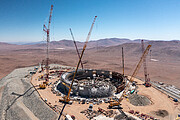Announcement
New report recommends future course for European astronomy
3 May 2023
A new report by an international consortium of leading astronomers, including ESO staff, sets out recommendations to transform our understanding of the Universe in the next decade.
The ASTRONET Science Vision and Infrastructure Roadmap 2022-2035 is the latest comprehensive roadmap produced by the ASTRONET network of European funding agencies, communities and research organisations.
The roadmap establishes key priorities, such as understanding the origin of the Universe and the evolution of planets in our Solar System, as well as making recommendations on the facilities and resources needed to meet these priorities. A continued supply of highly trained and motivated researchers will also be fundamental to progress and societal engagement.
Among the major proposed European investments, which include the Einstein Telescope (a gravitational-wave observatory) and the European Solar Telescope, the new report mentions that “completion of the construction and commissioning of the ESO Extremely Large Telescope (ELT) and its first generation instruments (…) are of key strategic importance”. It also highlights the Cherenkov Telescope Array (CTA) as a strategic priority in ground-based astronomy. ESO is part of the CTA Observatory, the organisation running CTA, and will host its southern-hemisphere array at the ESO Paranal Observatory in Chile.
Furthermore, the report highlights the importance of continued investment in upgrades and extensions of multiple projects connected to ESO, namely the upgrade of the Atacama Large Millimeter/submillimeter Array (ALMA) and the development of new instruments for ESO’s Very Large Telescope and ESO’s Very Large Telescope Interferometer.
Finally, the report highlights sustainability and accessibility as strong priorities for the European astronomy community and showcases the importance of fostering a positive impact of astronomy on society, in line with ESO’s efforts in these areas.
The aim of the ASTRONET report is to create an openly accessible resource for policy makers and science leaders to support informed decisions that more effectively and efficiently direct scientific discovery.
ASTRONET is an independent consortium whose aim is to create a common science vision for all European astronomy by convening diverse groups to describe the challenges facing some of the biggest questions in science.
Panels including over 100 scientists from across Europe fed into the report and a series of public consultations were also held to ensure that it reflected the breadth of views within astronomy.
The previous ASTRONET Science Vision and Infrastructure Roadmap (published in 2007 and revised in 2015) included recommendations which fed into proposals for world famous scientific infrastructure such as the ELT and the Square Kilometre Array Observatory (SKAO).
You can read the full report on the Astronet website.
More Information
ASTRONET was formed in 2005 as a consortium of European funding agencies and research organisations (ESO, ESA and the SKAO are all engaged with its work). One of its key goals is to deliver a strategic plan and an infrastructure roadmap and to promote the adoption of the roadmap recommendations.
ASTRONET was an EU-funded ERA-NET up to 2015, in the context of HORIZON 2020 and with the support of the European Commission. It is now a self-sustained group of funding agencies and associated bodies. ASTRONET seeks to include the whole astronomical domain: from the Sun and our Solar System to the limits of the Universe. Research is advanced using studies from facilities on the ground as well as in space observations alongside theory, laboratory astrophysics and computing.
Links
Contacts
Bárbara Ferreira
ESO Media Manager
Garching bei München, Germany
Tel: +49 89 3200 6670
Email: press@eso.org
About the Announcement
| Id: | ann23005 |

